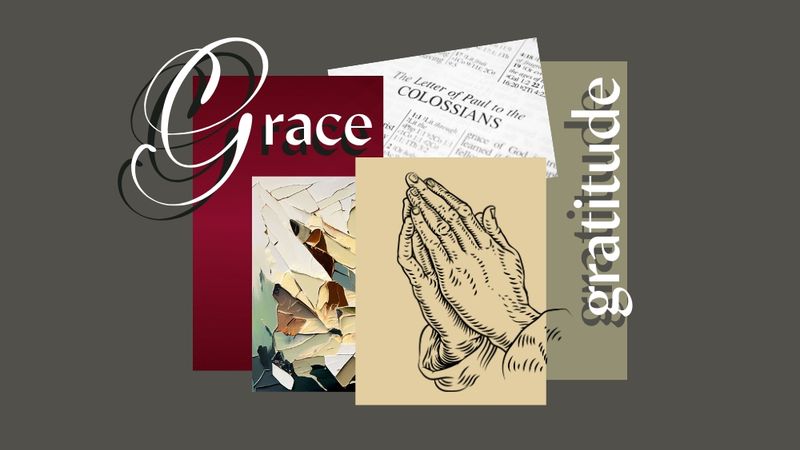While we might think the opposite of gratitude is “ingratitude,” this isn’t very helpful. It is akin to looking up a definition for a word only to find the same word in the definition. A more precise inverse of gratitude is restlessness. To be “restless” is to be overwhelmed by the feeling that you are lacking something and, what’s more, that you are obligated to make up for what is lacking by what you do or don’t do. Instead of an awareness of what has been done, restlessness only seems to notice what you haven’t done or what you don’t have. As a result, the “gospel” of restlessness says that it is through your activity and/or productivity that fulfillment is experienced and wholeness is found. This rhetoric is wholesale fiction, though. After all, if you are the one responsible for making up what is lacking, gratitude is impossible.
This, in many ways, is the framework by which Paul’s letter to the Colossians is best understood, as he writes with a hyper-focus on Christ alone. Similar to his letter to the Ephesians and the anonymous letter to the Hebrews, Colossians is an exercise in epistolary precision in which the apostle addresses a series of concerns that all have the same solution—namely, the offering of Christ in the gospel, in whom is found “all the riches of full assurance of understanding and the knowledge of God’s mystery” (Col. 2:2). Before Paul gets to the heart of his dismantling of the syncretism and “self-made religion” (Col. 2:23) that was wreaking havoc on this beloved congregation, he shares a few words of gratitude for the Colossians themselves. “We [Paul and Timothy] always thank God, the Father of our Lord Jesus Christ,” he says, “when we pray for you, since we heard of your faith in Christ Jesus and of the love that you have for all the saints” (Col. 1:3–4).
This, to be sure, is not an example of introductory fluff or filler. Neither is he buttering them up so they receive his later words more amicably. Instead, Paul shows them (and us) that the best method of resistance against the so-called wisdom of “self-made religion” is through a sincere sense of gratitude. Bookending Paul’s opening salvo are words of “thanksgiving” (Col. 1:3, 12), which capture his gratitude for the fruitfulness of the ministry of the gospel in their midst. In so doing, Paul not only conveys how grateful he is, but he also invites the Colossians to do the same. This allows us to understand that the euangelion is an announcement that creates eucharisteō in those who receive and believe it.
Despite the elusiveness of this emotion, gratitude is, perhaps, best defined as the awareness of something being done for or given to you at the expense of someone else.
But what does it mean to be “grateful”? Despite the elusiveness of this emotion, gratitude is, perhaps, best defined as the awareness of something being done for or given to you at the expense of someone else. What you lacked or didn’t have was supplied, in full, by another. To be “grateful,” therefore, means you were on the receiving end of someone else’s kindness, generosity, or grace. In many ways, this is the perfect summation of the gospel as it is communicated to the Colossians, wherein the fullness of God’s person and righteousness is given to sinners in the person and work of Christ alone. The announcement of this gift, in which nothing is left undone or incomplete, is one that generates gratitude since it gives sinners all of Christ.
It was precisely this announcement that had come under intense scrutiny and re-evaluation in Colossae. Through a smattering of novel philosophies and what Paul refers to as “self-made religion,” the Colossians had become inundated with rhetoric that had the “appearance of wisdom” but was ultimately valueless (Col. 2:8, 23). These other systems of spirituality could never make you whole or fill you up precisely because they were impotent from the jump. The upshot of these syncretized religious theories was that Christ’s work on the cross wasn’t enough. It was insufficient and, therefore, had to be supplemented by one’s “religiosity” or capacity to abide by the right do’s and don’t’s (Col. 2:21). Accordingly, faith was a gaze of the soul that looked not only to Christ but also to what must be adhered to or abstained from. Only then could one’s faith be made “complete.” Only then would one be qualified and made whole. All of which is to say that the byproduct of these “other religions” fomented not gratitude but restlessness.
Since gratitude is inherently focused on what has been done for you by someone else, to be grateful means to look outside of yourself for what you need. These “syncretized religions” weren’t turning sinners into grateful worshipers. Rather, they were turning the Colossians in on themselves. The good news was good, but only partially so. It didn’t offer a complete Christ. A portion of the euangelion was left up to them to complete or else risk disqualification by the religious elites (Col. 2:16, 18, 21). Instead of inspiring more gratitude, syncretism resulted in more restlessness, urging them to furiously search within themselves for what was freely offered in Christ. They were obliged to do something or avoid something to make up for what was apparently missing in the gospel.
Paul, of course, emphatically and categorically disagreed, insisting upon the fact that we do not become “qualified” followers of Christ once we do or don’t do certain errands or exercises. Rather, the good news tells us that our qualification is found in the Son of God alone. It is God in Christ “who has qualified you to share in the inheritance of the saints in light” (Col. 1:12). He alone rescues filthy sinners like you and me by assuming the penalty for our sins as his own, and thereby releases us from the tyranny of sin and death by dying in our stead. In other words, you are utterly incapable of “qualifying yourself.” Notwithstanding what we try or do, all of our attempts to be self-sufficient end up falling short. Every scheme we employ to make ourselves right with God proves ineffective. Our only hope is for someone to “qualify” us by giving us his qualifications—which, of course, is exactly what the gospel says has occurred in and through Christ alone.
Necessarily, then, the gospel is a gratitude-generating announcement since it offers us the fullness of God’s righteousness, grace, and wisdom received by faith alone. It declares that there is nothing we need that isn’t already included and given to us in Christ. Paul very intentionally, therefore, begins Colossians with a call to “give thanks” because true gratitude is only a fruit of the gospel. Indeed, a distinctive feature of the Christian faith is the gratefulness it inspires and instills in us. “Paul is never finished with thanksgiving,” R. C. Lucas comments. “He overflows with it. For him it is the characteristic hallmark of the Spirit-filled life” (40). “The Christian heart,” Stephen Freeman once wrote, “is manifest most prominently in the giving of thanks.” An ungrateful Christian is a contradiction in terms, which is perhaps why Paul places such an emphasis on an attitude of gratefulness throughout his letter to the Colossians (Col. 1:3, 12; 2:7; 3:15, 16, 17; 4:2).
Secular psychologists and sociologists all understand that “gratitude” is the best “attitude” for a healthy life. Researchers at Harvard, UC Berkeley, and UCLA, for example, have all published studies linking one’s “happiness” to one’s sense of gratitude. This has resulted in a renewed interest in the “psychology” or “science” of gratitude, leading to a number of online “gratitude scales” and questionnaires that are designed to quantify one’s level of gratefulness. Most, if not all, of these peer-reviewed reports conclude by offering advice on how one can get better at being more grateful (which is more than a little ironic since this puts the burden of gratitude on one’s own ability to adequately and consistently perform X, Y, and Z). No wonder our collective sense of gratitude is on the decline if it hinges on our resolve to form the right habits.
Instead of an attitude that is tailored, gratitude is a reflex that occurs when you are given a gift you do not deserve. No amount of science, philosophy, or regimen, therefore, can instill gratitude in you like the gospel can (and does).
Gratitude is not a coercible emotion. Neither can it be manufactured by the right deployment of techniques and routines. Instead of an attitude that is tailored, gratitude is a reflex that occurs when you are given a gift you do not deserve. No amount of science, philosophy, or regimen, therefore, can instill gratitude in you like the gospel can (and does). In the parlance of the apostle, gratefulness is cultivated as we hear again what we have “heard before in the word of the truth, the gospel,” which gives us Christ (Col. 1:5). The restlessness and ingratitude that so often creep up on us is counteracted only by a steady stream of hearing the euangelion, which invites those who are weary and restless to find rest in, with, and through Christ alone (Matt. 11:28). “The heart and centre of all occasions for thankfulness,” Alexander Maclaren attests, “is the Redemption which we receive in Christ” (64).
Only as the gospel is announced, received, and believed over and over again can our hearts be gripped by the gratitude that flows from the severed side of Christ alone. As the old saying goes, “We need the gospel every day because we forget it every day.” Indeed, what makes the gospel so utterly and divinely unique is that the more we hear it, the deeper it gets. True gratitude, you see, is symbiotically tethered to the grace of the gospel, which, like a yawning cavern, gets more expansive the longer we are alive. Here’s how Brennan Manning once put it:
The deeper we grow in the Spirit of Jesus Christ, the poorer we become—the more we realize that everything in life is a gift, the tenor of our lives becomes one of humble and joyful thanksgiving. Awareness of our poverty and ineptitude causes us to rejoice in the gift of being called out of darkness into wondrous light and translated into the Kingdom of God’s beloved Son” (80).
The life of faith, therefore, is best understood as a eucharistic life; it is one of “abounding thanksgiving” (Col. 2:7). This is the result of the announcement of the gospel, which always gestures toward the sufficiency of Christ’s self-sacrifice as the means by which we are redeemed and reconciled to God. There is nothing to finish or complete. The gospel places the fullness of God’s grace and power into our hands by giving us all of Christ’s person and work. Because of him, sinners like us are qualified to stand before the Father in the shadow of a righteousness not our own. Only Christ can accomplish all of this for us—and the good news tells us that he already has. All that is left for us to do, then, is receive and be glad.




